Among the Center's flagship programs is our Colloquium Series, first presented in 2021. We work collaboratively to develop the program, inviting experts in their fields from outside the university to address current topics in education innovation. Our theme this year is: Identity as it Relates to Teaching and Learning.
Sign up for our email event updates to stay in touch!
Fall 2024 Colloquia
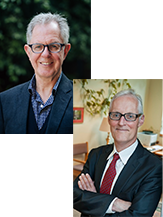
Who Are Our Students? Nurturing Identity and Inclusion in Education
Featured Speakers: Andy Hargreaves (Acclaimed Author and Thought Leader in Public Education & Research Professor at Boston College) & Dennis Shirley (Global Leader in Educational Reform, Author & Research Professor at Boston College)
Featured Speakers: Andy Hargreaves, Acclaimed Author and Thought Leader in Public Education & Research Professor at Boston College, & Dennis Shirley: Global Leader in Educational Reform, Author & Research Professor at Boston College
Wednesday, November 20th, 2024 5:30 - 6:30 PM
Moderated By: Dr. Kari Sassu, Interim Dean, College of Education and Director, Center of Excellence for Teaching and Learning & Dr. Christopher Trombly, Interim Dean, College of Education
About the Program:
In this engaging presentation, Shirley and Hargreaves will explore how identity formation impacts students' educational experiences and sense of belonging in school communities. They will analyze how factors such as race, culture, gender, and socioeconomic background shape students' self-perceptions and relationships with peers and teachers. Drawing from their research and insights from The Age of Identity, they will emphasize the need for schools to create inclusive environments that celebrate diversity. Attendees will gain practical strategies to support identity development and foster inclusive learning spaces that enhance student engagement and well-being.

About Andy Hargreaves:
Andy Hargreaves is a Visiting Professor at the University of Ottawa and a Research Professor at Boston College. He is an elected member of the US National Academy of Education and has held prestigious roles such as President of the International Congress of School Effectiveness and Improvement and Adviser in Education to both the Premier of Ontario and the First Minister of Scotland. As co-founder and president of the ARC Education Collaboratory, Andy brings together leaders from multiple countries to promote excellence, equity, well-being, inclusion, democracy, and human rights in education.
With over 30 books and 8 Outstanding Writing Awards to his name, Andy’s contributions to public education have been recognized in Canada, the US, and the UK. Ranked as the #15 most influential scholar on US education policy by Education Week, he has received numerous honors, including Honorary Doctorates from universities in Hong Kong, Sweden, and the UK. He is also a Fellow of the Royal Society of Arts.
An exceptional keynote speaker and workshop leader, Andy has presented in over 50 countries and across the US, Australia, and Canada. His recent books, many co-authored with Dennis Shirley, include The Age of Identity, Leadership from the Middle, Well-being in Schools, Five Paths of Student Engagement, Moving: A Memoir of Education and Social Mobility, and Collaborative Professionalism.
Currently, Andy is collaborating with the LEGO Foundation and the University of Ottawa on a project supporting play-based learning for minoritized students in over 40 schools across Canada, aiming to enhance educational experiences through creativity and inclusion.
Andy’s lifelong dedication to education continues to shape the global conversation on how schools can uplift and inspire students from all backgrounds.
About Dennis Shirley:
Dennis Shirley is a Research Professor in Formative Education at Boston College’s Lynch School of Education and Human Development. He is dedicated to improving teaching and learning to help students thrive in any environment. His research explores the tension between educators' ideals and the realities of power and politics. A charismatic speaker, Dennis has led professional development workshops across six continents, with his work translated into numerous languages. Currently, he's collaborating with the Bosch Foundation in Germany and IMTEC in Norway to study and spread large-scale educational reform.
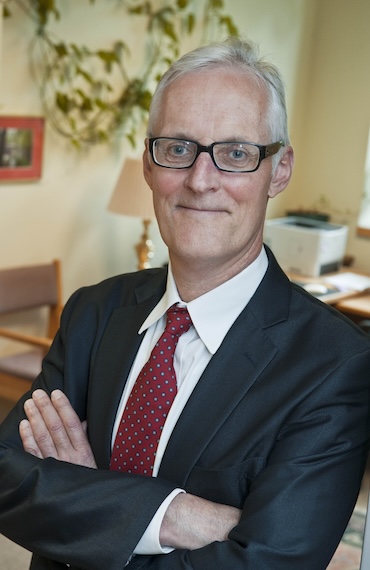
In partnership with Andy Hargreaves, Dennis has co-authored three recent books. Five Paths of Student Engagement explores how educators can foster joyful, meaningful learning experiences. Well-being in Schools offers strategies to uplift students in today’s volatile world, and The Age of Identity addresses how educators can help students discover their identities and sense of belonging. All three works guide educators in turning complex challenges into achievable, dignified goals. Dennis's work continues to inspire educators worldwide, empowering them to create meaningful, lasting change in schools and communities through thoughtful, compassionate leadership.
Spring 2024 Colloquia

How We Showed Up: Navigating Marginalized Identities in the Face of Imposter Syndrome
Featured Speaker: Maribel Sanchez, SCSU Associate Director of University Access Programs
Held on Thursday, May 9, 2024 (Virtual)
Moderated by: Dr. Kari Sassu, Interim Dean, College of Education and Director, Center of Excellence for Teaching and Learning
About Ms. Sanchez: Maribel Sanchez hails from Hartford, Connecticut and proudly identifies as Puerto Rican. She is Associate Director of University Access Programs (UAP) at Southern Connecticut State University. As a first-generation college student, she earned both her bachelor's and master's degrees from Eastern Connecticut State University. Maribel began her journey in higher education at the University of Connecticut, where she served as a TRiO Program Advisor, advocating for equitable access to higher education for first-generation and Pell-eligible students. Over her 19-year career, she has remained steadfast in her dedication to assisting students as they transition from high school to college. Aside from her professional endeavors, she is passionate about advocating for women’s access to reproductive health, LGBTQI rights, and immigrant rights.
Fall 2023 Colloquia
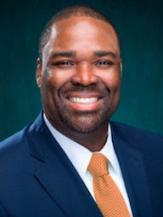
The Story Untold: Education of Blacks in the South
Featured Speaker: Dr. Lowell K. Davis, Vice President of Student Affairs at the University of Texas at Arlington
Held on Tuesday, December 12, 2023 (Virtual)
About the Program: We will explore what education looked like for Blacks in the South from 1863, which is when the Emancipation Proclamation was written, until approximately 1980. Participants will learn about the types of institutions, the curriculum, federal and state legislation as well as personal accounts of individuals who navigated education in the United States during this tumultuous period.
Moderated by: Dr. Kari Sassu, Director, Center of Excellence for Teaching and Learning, and Dr. Stephen Hegedus, Dean, College of Education.
About Dr. Davis: Lowell K. Davis is a native of Dallas, Texas and graduated in the top 1% of his class, where he was voted “Most Likely to Succeed.” Lowell graduated from Hampton University with a bachelor’s degree in English Arts-Secondary Education. There, he served in the capacities of Student Government Association President and Vice President and was voted Most Like to Succeed/Be on the Cover of Ebony Magazine. He has a master’s degree is in Counseling, with an emphasis on College Student Development; he also holds a Ph.D. from Indiana University in Higher Education Administration and Student Affairs, with an emphasis on the History of Education.
Today, Lowell serves as the Vice President of Student Affairs at the University of Texas Arlington. He most recently served as the Vice Chancellor for Student Affairs at the University of North Carolina Wilmington. He served as the Associate Vice Chancellor for Academic Affairs and Student Success at Western Carolina University (WCU) and completed an American Council on Education (ACE) Fellowship at the University of California Davis.
Lowell also worked at the University of Alabama (“Roll Tide!”) where he rose through the ranks of both Academic and Student Affairs. Lowell was selected as the staff member of the year for the Southern (athletic) Conference and is the immediate past president for the North American Association of Summer Sessions. Lowell is on the Executive committee for the Council of Student Affairs with the Association of Public and Land Grant Universities as well as the Council of Fellows for the American Council on Education.
Outside of work, Lowell has served in several leadership positions in Kappa Alpha Psi Fraternity, Incorporated. Additionally, he is a Paul Harris Fellow for Rotary International, serves on the Board of Advisors for the Baptist Children’s Home of North Carolina and is involved in several other social and civic organizations. At the core of Lowell’s professional and community activities is a strong appreciation for building relationships. Whether he is working with students, community members, coworkers or strangers, Lowell is always endeavoring to build bridges and strengthen his community.
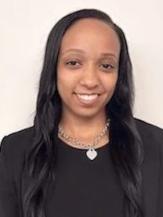
Hidden Figures: The Untold Experiences of Black Girls in School
Featured Speaker: Mykelle S. Coleman, Ph.D., NCSP, Educational Psychologist & Southern Alumna
Held on Monday, October 23, 2023 (Virtual)
About the Program: There is a limited discussion within our literature regarding the treatment that Black girls encounter in schools. This presentation will uncover the results of a current study that gained an increased understanding of Black girls’ school perceptions and experiences. This conversation focuses on identity, addresses the journey from a Black girl to a Black woman in education and highlights the importance of amplifying student voices to inform school practices.
Moderated by: Dr. Kari Sassu, Director, Center of Excellence for Teaching and Learning, and Dr. Stephen Hegedus, Dean, College of Education
About Dr. Coleman: Mykelle S. Coleman is passionate about amplifying the voices of communities. She is actively involved in research projects including school climate perceptions of minoritized student groups and the impact of school discipline on specific student populations. In addition, she has supported research projects that focused on microaggressions on university campuses and relationships within the field of social psychology. Her research interests are centered on advancing social justice in the field of psychology and promoting change through increased knowledge.
Dr. Coleman is a nationally and Connecticut state certified school psychologist with a Ph.D. in Educational Psychology, specialization in school psychology and area of concentration in school law, from the University of Connecticut. Dr. Coleman received her Bachelor of Arts from Western Connecticut State University with a degree in psychology. She is an alumna from Southern Connecticut State University, where she received her master’s degree and sixth-year certificate in School Psychology. Dr. Coleman is currently a post-doctoral fellow at a family-centered and multidisciplinary practice, Sasco River Center.
Spring 2023 Colloquia

Student Mental Health: Stress and Learning
Featured Speaker: Jean A. King, Peterson Family Dean of the School of Arts and Sciences, Worcester Polytechnic Institute, Worcester, MA
Held on Wednesday, May 3, 2023 (Virtual)
About the Program: The impact of stress and mental health during the pandemic have affected our students in multiple ways. We now need to better understand the impact of Covid stress on learning and memory for students. This talk will focus on neurobiological understanding of stress and learning on campuses.
Moderated by: Dr. Kari Sassu, Director, Center of Excellence for Teaching and Learning, and Dr. Stephen Hegedus, Dean, College of Education
About Dr. Jean A. King: Jean A. King is the Peterson Family Dean of the School of Arts and Sciences at Worcester Polytechnic Institute in Worcester, Massachusetts, and a Professor in the Departments of Biology and Biotechnology, Biomedical Engineering, and Neuroscience. She completed her Ph.D. in Biology and Neurophysiology at New York University, followed by postdoctoral fellowships first at Emory University (Psychology). Immediately thereafter she joined the faculty in the Department of Psychiatry at the University of Massachusetts Medical School, where she built an active research career as well as serving in numerous in leadership roles for both her department, (including Vice Chair of Research in Psychiatry, and founding Director of the Psychiatry Career Development and Research Office) and then at the institutional level (UMMS Vice Provost of Research), prior to her transition in 2017 to WPI to assume the role of Dean.
As a researcher, Dr. King’s work has been dedicated to elucidating the neurobiological bases of the stress response, including both vulnerability to stressors and resilience in the face of stress. The overarching goal of her work is to better understand the neural links between stress and mental health.
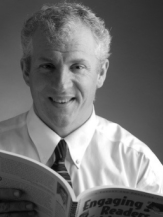
Knowing Your Own Mind: Why We Are All Susceptible to Information Pollution & What to Do about It
Featured Speaker: Dr. Jeffrey Wilhelm, Distinguished Professor of English Education, Boise State University
Held on Monday, April 17, 2023 (Virtual)
About the program: This interactive session explored why we all, as human beings, are exceptionally susceptible to information pollution of all kinds. A typology of different kinds of information pollution and their different features and effects will be shared. The second half of the session explored ways to know our own minds, and ways to teach learners to know and control theirs in ways that will help us identify, interrogate and control information pollution in texts of all kinds
About Dr. Jeffrey D. Wilhelm: Dr. Wilhelm is an internationally known teacher, author, and presenter. A full-time classroom teacher for 15 years and a university professor for 26 years (and counting!), Jeff Wilhelm is currently Distinguished Professor of English Education at Boise State, founding director of the Boise State Writing Project, and he teaches middle or high schoolers each spring. He has authored 42 texts about literacy teaching. His newest book, just out in February 2023, is Fighting Fake News: Identifying and Interrogating Information Pollution.
Fall 2022 Colloquia
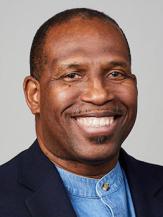
Promoting Resilience and Recovery in Educational Settings
Featured Speaker: Dr. Frank Worrell, President, American Psychological Association and Professor, School of Education, University of CA, Berkeley
Held in November 2022 (In-person program)
2022 Colloquium Series Theme: Mental Health as it Relates to Teaching and Learning
About the Program: The advent of the COVID-19 pandemic was and continues to be an historic event with major negative impacts on every aspect of our society. Already strained school systems and overextended school personnel were forced to pivot immediately to providing online services (e.g.,teaching, interventions) from their homes, while also dealing with the impact of the pandemic on themselves and their families. And although the pandemic itself had profound negative effects, these were exacerbated by several factors, including (a) the murder of George Floyd, (b) an insurrection in the nation’s Capital, (c) the ongoing effects of climate change, and (d) a war in Europe.
How should society respond to these crises and how do we support school systems and educators? In this presentation, Dr. Worrell argues that we need to continue to use evidence-based practices but with greater intention. We need to increase social-emotional supports for everyone in school contexts; make schools a place of safety and belonging for individuals from all demographic subgroups; avoid taking a deficit-based approach to schools and society; and promote hope as a counter to the negative forces in the present.
About Frank Worrell: Frank C. Worrell, PhD, is a professor in the Graduate School of Education at the University of California, Berkeley, where he serves as faculty director of the school psychology program, the Academic Talent Development Program, and the California College Preparatory Academy. He is a certified school psychologist as well as a licensed psychologist.
In addition to his position at UC Berkeley, Worrell is an affiliate professor in the social and personality area in the department of psychology. His areas of expertise include at-risk youth, cultural identities, scale development and validation, talent development/gifted education, teacher effectiveness, time perspective, and the translation of psychological research findings into school-based practice.
He has authored more than 200 academic publications and most recently co-edited The Cambridge Handbook of Applied School Psychology.
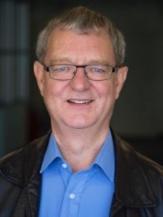
Leading Creative and Healthy Schools and Organizations in an Age of Complexity
Featured Speaker: Peter Gamwell, an award-winning leader in education and author of The Wonder Wall
Held in October 2022 (Virtual)
2022 Colloquium Series Theme: Mental Health as it Relates to Teaching and Learning
About the Program: This seminar focuses on three foundational imperatives and four supporting conditions that can help awaken the seeds of brilliance that lie in everyone. Peter Gamwell illustrates this with stories and videos where people are indeed making the extraordinary happen and, in so doing, changing lives.
About Peter Gamwell: If we are going to make our organizations creative, dynamic, diverse and above all, successful, then we must believe in the creative capacities of every person, no matter what their position or title, and put into place the conditions that enable creative abilities to flourish. For the past ten years, Peter has led a team of hundreds to find out just what those conditions are, with some eye-opening results.
Born in Liverpool, England, Peter is the author of The Wonder Wall, a presenter, and an award-winning leader in education. Working closely with such renowned creativity experts as Sir Ken Robinson and Sir John Jones, Peter has become recognized internationally as a leader and catalyst for creative change initiatives that inspire and advance organizational cultures.
A critical component of Peter’s work was the publication of a system and community action research study guided by the question, “What are the conditions under which creative and healthy individuals and organizations flourish?” In 2013, Peter’s work was recognized when he was given the Distinguished Leadership Award by the Ontario Public Supervisory Officers’ Association, representing one of the most successful education jurisdictions in the world.
Spring 2022 Colloquia

Mindfulness Tools for Teachers & Learners: Neuroscience Informed Strategies for Emotional Resilience
Featured Speakers (Yale Medical School): Dr. Denis G. Sukhodolsky, Professor, & Dr. Michael Crowley, Associate Professor
Held in March 2022 (Virtual)
2022 Colloquium Series Theme: Mental Health as it Relates to Teaching and Learning
About the Program: This seminar focused on mindful approaches to coping with negative emotions, the academic impact of the pandemic on students and teachers, and what is meant when discussing stress, anxiety, irritability, and trauma.
About the Speakers: Dr. Denis G. Sukhodolsky is a Professor in the Child Study Center, Yale School of Medicine. Dr. Michael Crowley is an Associate Professor, also with the Child Study Center, Yale School of Medicine.
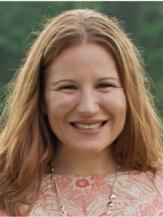
Positive Emotions and Relationships: The Bridge to Engagement
Featured Speaker: Dr. Shannon Suldo, Professor, School Psychology, University of South Florida.
Held in February 2022 (Virtual)
About the Program: This webinar focused on the promotion of subjective well-being through positive psychology programs and practices that generate positive emotions and strengthen relationships. Interventions associated with increased classroom engagement and performance were presented. Participants learned evidence-based strategies for supporting stress management and wellness promotion, decreasing negative emotions and cultivating gratitude.

